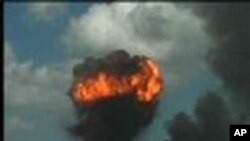On March 15, 2008, a series of massive and deadly explosions ripped through an Albanian government munitions depot in the village of Gerdec, near Tirana. Twenty-four people were killed and more than three-hundred others were injured. Catastrophic damage was done to hundreds of homes and other civilian structures within a 2.5 kilometer radius of the blast. The initial explosion involved old, unstable ammunition, improperly stored and handled.
Since the Gerdec disaster, horrific explosions at munitions storage depots have also taken place in populated areas of Uzbekistan and Bulgaria. They are but the latest in a series of incidents spanning many years and are among the recent manifestations of a widespread international problem that has worsened since the end of the Cold War. In many parts of the world, especially in developing countries, government arms depots filled with aging, unstable, poorly maintained, improperly stored, and weakly guarded munitions wait like a ticking bomb. These dangerous depots have the potential to cause even more casualties annually than are already being caused by landmines and explosive remnants of war.
For example, on a single afternoon in 2007, an explosion at a munitions depot outside Mozambique's capital, Maputo, killed or wounded over six-hundred people, far more than the thirty-five people reportedly killed by landmines and explosive remnants of war in Mozambique during the previous year.
The United States has long recognized the growing humanitarian threat to innocent civilians around the world. Millions, including many children, live, work, attend school, and worship in close proximity to ageing artillery shells, bombs, and other high explosives, such as naval mines, particularly prone to spontaneous explosions due to improper storage and unsafe handling. The Office of Weapons Removal and Abatement in the U.S. State Department's Bureau of Political-Military Affairs provides physical security and stockpile management assistance to countries seeking to deal with their dangerous depots. In cooperation with the U.S. Department of Defense’s Defense Threat Reduction Agency, such assistance is already being provided at the request of several countries around the world, including Ukraine.
Times change and security needs change with them, but maintaining munitions safely is a demanding, continuing responsibility. The United States is prepared to help more countries meet that responsibility and protect their people.
Since the Gerdec disaster, horrific explosions at munitions storage depots have also taken place in populated areas of Uzbekistan and Bulgaria. They are but the latest in a series of incidents spanning many years and are among the recent manifestations of a widespread international problem that has worsened since the end of the Cold War. In many parts of the world, especially in developing countries, government arms depots filled with aging, unstable, poorly maintained, improperly stored, and weakly guarded munitions wait like a ticking bomb. These dangerous depots have the potential to cause even more casualties annually than are already being caused by landmines and explosive remnants of war.
For example, on a single afternoon in 2007, an explosion at a munitions depot outside Mozambique's capital, Maputo, killed or wounded over six-hundred people, far more than the thirty-five people reportedly killed by landmines and explosive remnants of war in Mozambique during the previous year.
The United States has long recognized the growing humanitarian threat to innocent civilians around the world. Millions, including many children, live, work, attend school, and worship in close proximity to ageing artillery shells, bombs, and other high explosives, such as naval mines, particularly prone to spontaneous explosions due to improper storage and unsafe handling. The Office of Weapons Removal and Abatement in the U.S. State Department's Bureau of Political-Military Affairs provides physical security and stockpile management assistance to countries seeking to deal with their dangerous depots. In cooperation with the U.S. Department of Defense’s Defense Threat Reduction Agency, such assistance is already being provided at the request of several countries around the world, including Ukraine.
Times change and security needs change with them, but maintaining munitions safely is a demanding, continuing responsibility. The United States is prepared to help more countries meet that responsibility and protect their people.




